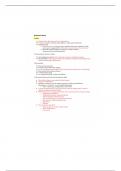Respiratory Drugs:
Asthma-
❖ Characteristics- Bronchoconstriction, Inflammations
❖ Symptoms- dyspnea, wheezing, chest tightness, cough, sputum production
❖ Pathophysiology
➢ Bronchoconstriction narrows airways- sphincter action can completely occlude
airway and it is aggravated by inflammation, mucosal edema, excessive mucus
➢ Mast cells release substances in response to causative stimuli=
bronchoconstriction and inflammation
Two main pharm classes for asthma
❖ Anti-inflammatory against- Glucocorticoids, cromolyn, montelukast (singular)
❖ Bronchodilators- Beta 2-agonists (albuterol/ terbutaline), theophylline/aminophylline and
inhaled anticholinergics (ipratropium)
Client teaching
❖ Take meds as prescribed
❖ Consult with provider before stopping
❖ Use bronchodilators first and follow with corticosteroids 5 minutes later if on both drugs.
❖ Rinse and spit after inhalation therapy
❖ 1 minute between puffs
❖ Use a tight fitting mask in infants and children.
Corticosteroid/ glucocorticoids (anti-inflammatory drug)
● Most effective drug to treat asthma (first line therapy)
● Supressess inflammation
● inhalation= moderate to severe asthma symptoms use daily (beclomethasone
dipropionate) , oral and IV= sever symptoms (prednisone)
○ The two main drugs, all drugs always end in ONE
● Used for prevention therapy. They are not used to abort an ongoing attack. Used on a
regularly scheduled basis and not PRN
● Side effects (more of a long term side effects, short term they get more of local reactions)
○ Oropharyngeal candidiasis
○ Sydphonia (hoarseness, speaking difficulty)
○ Adrenal suppression (long term use)
○ Bone loss (particularly in premenopausal women)
○ Slow growth in children (long term use)
○ Peptic ulcer
○ Infection
● Ways to decrease side effects
○ Decrease dose (do not give to high of dose)
○ Rinse mouth after use
○ Use a spacer
, ● Nursing considerations
○ Not for acute attack, give the lowest possible dose, regular schedules does not
PRN
○ Supplemental dose as needed in time of stress (trauma, surgery, infection)
○ Taper dose
○ Dry mouth use humidifier, increase fluid
○ Observes signs of infection(fever, sore throat) and electrolyte imbalance (weight
gain, edema, weakness)
○ NSAIDs increase GI ulcer and bleeding
Cromolyn
● Mast cell stabilizer (long term txt for allergy related asthma)
● Used for prophylaxis, not quick relief
● Suppress inflammation
● Nebulizer- inhalation
● Adverse effects: safest of all anti asthma medications, dry mouth/cough/bronchospasm/
bitter aftertaste/headache
● prophylaxis= exercise induced asthma- use 15 min before/ long term reg schedule daily
Montelukast (antileukotriene drugs- these drugs always end in Lukast)
● Actions: prevent the effects of leukotrienes, thereby suppressing inflammation,
bronchoconstriction, airway edema and mucous production
● Indication: long term management of asthma
● Use with caution with those who have liver dysfunction
● Montelukast is the most commonly used receptor blocker
● Not used for quick relief
● PO
● s/e: headache
● Monitor liver function- little bit of concern
Bronchodilators
● Provide symptomatic relief but do not alter the underlying disease process (inflammation)
○ In almost all cases, patient taking a bronchodilator should also be taking a
glucocorticoid for long term suppression of inflammation
● Some can cause heart problem
Beta 1 adrenergic (activated with stress)
● Heart- increase heart rate and the force of contraction and conduction (AV node) (cardiac
arrest, HF, shock) (altered rhythm and angina
● Kidney-renin released
Beta 2 adrenergic (used for asthma)(activated with stress)
● Bronchial dilation (asthma)
● Relaxation of uterine muscle (delay of preterm labor)
, ● Glycogenolysis (breakdown of glycogen into glucose)
● Side effects (hyperglycemia and tremor)
Beta 2- adrenergic agonist
● Most effective drug for relief of acute bronchospasm and prevention of exercise induced
bronchospasm
● Quick relief and long term control
● Adverse effects
○ Inhaled- systemic effects- tachycardia, angina and tremor
○ Oral- excessive dosage-angina pectoris, tachydysrhythmias, tremors
Albuterol (proventil) (short acting bronchodilator
● Used in the management of reversible airway obstruction
● Action: bind to beta 2 adrenergic receptors in airway smooth muscle
● Adverse effects
○ NS: nervousness, restlessness, tremor, headache, insomnia
○ Cardiovascular: chest pain, palpitations, angina, hypertension, tachycardia (high
dose)
● Nursing considerations
○ Avoid caffeine
○ Bronchodilator before glucocorticoid
○ Monitor tachycardia, angina, hypertension
formoterol/salmeterol (long acting bronchodilator)
● Can increase the risk of asthma related death
● Should be used only by patients taking an inhaled glucocorticoid for long term control
and only if it is inadequate by itself
● Regular not PRN
Theophylline (theolair, theochron)
● Narrow therapeutic index- Plasma level 10 to 20 mcg/ml
● CV toxicity: mild (N/V, diarrhea, restlessness), severe (tachycardia, arrhythmia,
convulsion-> 30 mcg/ml)
● Nursing consideration- avoid coffee/ monitor plasma level/ monitor tachycardia/seizures
Ipratropium (atrovent)
● Inhaled anticholinergics
● Dresses stimulation of PNS: dry mouth, urinary retention, hoarseness, increased
intraocular pressure (routine test for glaucoma)
● Not for emergenyc resume
● Beta2 agonist increase bronchodilation
● Not for patients allergic to peanuts




